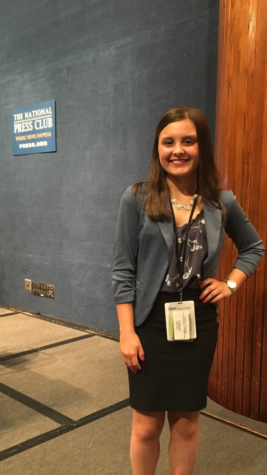‘Why not paint a rainbow on the walls?’
June 7, 2018
Every day, Somerset Berkley Regional High School students are surrounded by the same four walls. Though these walls create a sense of community, others are stuck on the wrong side of these vast panels, banging on the doors and shouting to be let in, hoping one day that these barriers to fitting in will someday be knocked down.
“In small towns, as the saying goes, everyone knows everyone (and thus everyone’s business). When you don’t fit into the criteria of the majority, you feel out of place, as it is more noticeable,” Laura Guirand, a senior who is an African American, said.
Most students agree that SBRHS is not diverse at all. In fact, according to niche.com, the students in the school are composed of 93.3% white, 2.1% Hispanic, 1.7% multiracial, 1.5% African American, 1.4% Asian, 0.1% Pacific Islander, and 0% Native American people.
The lack of diversity has led some of those who do not fit into the four white walls of SBRHS to feel their differences become magnified.
Guirand does not feel out of place because she has spent her whole life growing up in a predominantly white town.
“The only time I’ve felt uncomfortable is when we talk about current social issues in school and we have to talk about racial conflict. I feel as if all eyes shift on me in class discussions,” Guirand said, as she is usually the only African American student in the class.
Ryan Silverman, a junior who is Jewish, said that he does not feel out of place at school. However, people have asked him questions about his faith, which he does not mind answering, and he has to explain why he will be absent for the High Holidays at the beginning of the school year.
“SBRHS is not a very religious school so talk about religion is often casual; a majority of students don’t seem to judge students based off religion,” Silverman said.
On the other hand, Olivia Lucianno, a senior who is a Chinese-American, said that she often felt out of place in school when she was younger because the Chinese population in Somerset is so sparse.
“The lack of Chinese or Asian people in general, combined with the lack of discussion or lessons on non-Western cultures and peoples until the high school level, is what contributed to my feelings,” Lucianno said.
Salena Rivera, a junior who is Hispanic, said that “people make jokes about how I’m Hispanic and say that I have a short temper because I’m Latina when I actually don’t fit the typical stereotype. I just think it’s funny though.”
She said that people often make comments to her that she will slap them because she is a Latina or that she eats tacos every day.
However, these things do not bother her because “it’s their fault that they’re ignorant, not mine.”
Lucianno said that one time in elementary school, there was “at least one kid pulling at the edge of their eyes and making some sort of Asian racial slur at me.”
She told one of her teachers and they handled it from there.
She is also confronted with the stereotype that Asians are supposed to be very intelligent all the time. This creates an atmosphere of pressure on her to live up to these expectations. People always assume that her answers should always be right or that she should do well on a test. While she says other kids face this burden, it is because of their academic history and not because of their race.
Silverman said that “hate is all around us,” as he has had pennies thrown at him (because of the stereotype that Jews are cheap) and has had to endure Holocaust jokes being made at him during his freshman year gym class.
Silverman said that he tried to ignore the student who was doing this and his friend told the student to stop. Gym teacher Jonathan Berube stepped in on Silverman’s behalf and put an end to it.
Last year, someone burned a swastika into a sign on a bike path near his synagogue.
Erin Rockcliffe, a senior who is gay, said that she faces homophobia constantly.
She said that, in high school, a teacher was talking about atoms and compared it to the LGBTQ community. The teacher said how “‘two men being together isn’t normal, just like two positive atoms being together aren’t normal,’” and all of her friends looked at her and at each other in shock.
Another time, a student teacher called her out in front of the class for being gay when they were reading a piece of literature that had a main character who was also gay.
People have called Rockcliffe slurs and when she first came out, people would avoid changing near her in the locker room. However, she sticks up for herself because she does not take anything from anyone.
“No one gets how it is to be a part of the LGBTQ community unless they are in it,” Rockcliffe said.
Furthermore, Guirand said that she has heard the n-word used a lot in school.
“Since our school is predominantly white, they shouldn’t be using that word to talk to their friends,” Guirand said. “The n-word was reclaimed by black people, as it was used in the past as a derogatory term towards black people that was used by white people. When it is used by white people again in this time, it is very disrespectful and blatantly racist.”
However, Guirand has never been discriminated against personally, which makes her feel guilty.
“I know that seems weird to say but so many colored people suffer at the hand of racism and it is so disgusting to think about since we are in 2018 and this has been happening since colonization,” Guirand said. “I almost felt like I had to face racism to understand the reality that this is happening still, as it has never happened to me.”
Guirand said that she has lived her life “just waiting for the inevitable moment when someone discriminated against me and how I would move forward with my life knowing I’ll be continuously judged, not for my character but rather the color of my skin.”
Because of the lack of diversity that students have experienced throughout their lives, they feel that they fit into the predominantly white culture of Somerset and Berkley but feel alienated from their own culture.
Lucianno has developed this incredible fascination with Asian culture and modern family dynamics.
“I think if I attended school with more Asians, I would feel much more at ease and secure with my culture,” Lucianno said.
Guirand feels like she fits in but, at the same time, she does not “feel connected to other people like me since I don’t have the opportunity to engage in black culture.”
Some students agree that the high school follows through on championing everyone’s differences, while others think that it falls short in this aspect.
“All I can say is it’s not hard to promote differences and tolerance when everyone is very similar culturally,” Silverman said.
Guirand thinks that the students and staff are accepting of others’ differences, but at the same time recognizes that there is no colored faculty at the high school.
Students also believe that this lack of diversity also contributes to a close-mindedness of the student body as a whole.
“Until I took world history this year, I really did not know much about Asian and African history or religion,” Silverman said. “I’m also sure that I, and the majority of the population of SBRHS, do not know many things that affect people around the world.”
Rockcliffe and Rivera believe that the lack of understanding can be fixed through education about what they are going through from people that have actually experienced it.
However, Guirand, Lucianno, and Silverman believe that there is no way to fix the lack of diversity in SBRHS.
“To fix limited diversity in SBRHS, you would have to fix inequality around the entire globe,” Silverman said. “Somerset is a relatively well-off town in general. The reason why most of the population is white is because whites do not have to face the discriminatory obstacles that many other groups have to face in order to succeed financially. Ultimately, diversity at SBRHS will only every occur if society views all as equal.”
Despite the negativity these students have faced, they have strong bases of support to keep them going despite adversity.
“My biggest supporters are my parents because I come from a diverse family and they know what it feels like to be in my position,” Rivera said.
Rockcliffe’s biggest supporters have included her sister, brother, and mother.
“They are all so amazing and have never judged me or made me feel different,” Rockcliffe said. “My mom has been my world and she means a lot to me and has never once made me feel unloved for loving who I love.”
John Correia, a history teacher at the high school, has been one of Guirand’s biggest supporters. Both of Guirand’s parents are from Haiti, and Correia has been to the island and frequently engages her in conversation about how beautiful it is and how he wants to go back.
Furthermore, Elizabeth Sylvia, an English teacher at the high school that no longer works at SBRHS, cried when she read Guirand’s poem last school year about being black in a white community.
“I just felt she understood me in that moment,” Guirand said.
When Rockcliffe becomes a teacher after she graduates college, she “wouldn’t dare make someone feel like they have to fit within the four white walls. Why not paint a rainbow on the walls?”




Theresa Abrams • Jul 5, 2018 at 4:04 PM
It would’ve been nice to have Special Needs included in the article. They were left out as they often are.